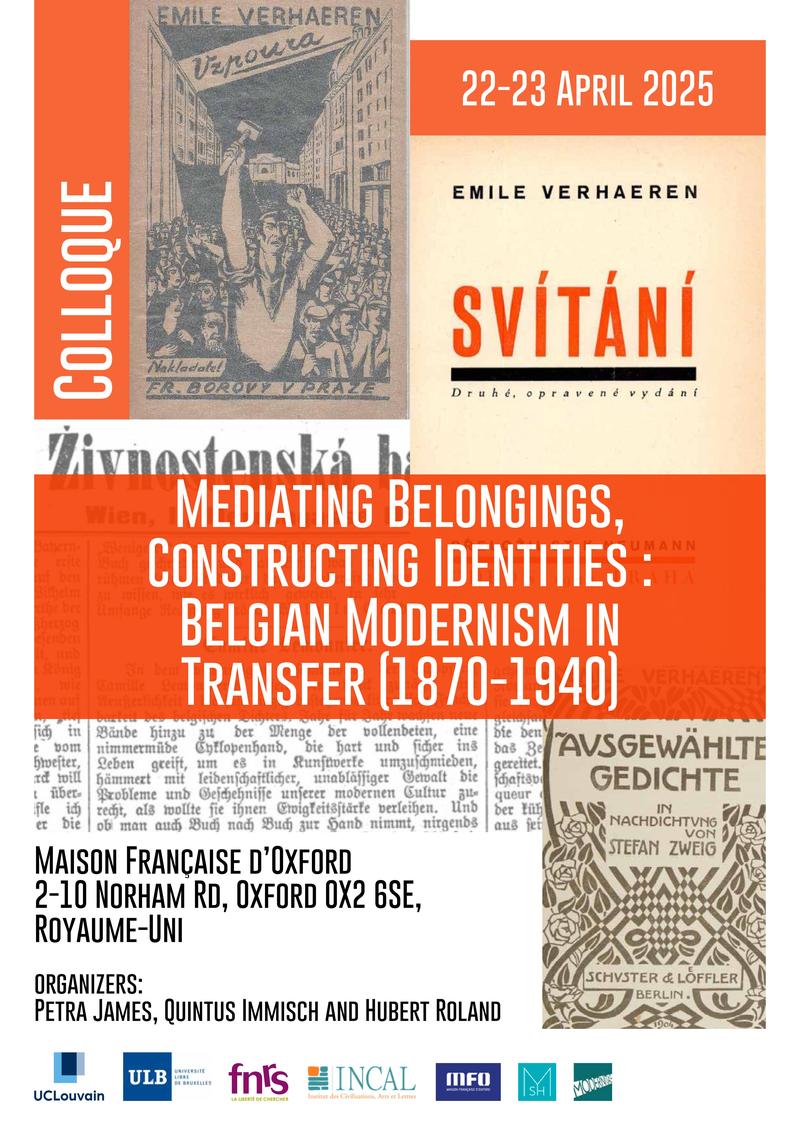Workshop 'Mediating Belongings, Constructing Identities : Belgian Modernism in Transfer (1870-1940)'
22-23 April 2025, Maison Française d’Oxford
CALL FOR PAPER
Conference Languages: English, French, German
Send an abstract of 300 words to: quintus.immisch@uclouvain.be
Deadline for submissions: 30 December 2024
The conference is organized as a part of the FNRS (Fonds de la Recherche Scientifique, Belgium) project entiteled “Belgium ‘Read’ in German and Czech” (2024-2027), directed by Petra James (Université libre de Bruxelles) and Hubert Roland (UCLouvain).
Topics and Questions
The discussion of a national ‘identity’, which has been very lively since the creation of Belgium in 1830, leads Belgian intellectuals such as Charles Potvin, Edmond Picard and Henri Pirenne to envisage the multiple affiliations of the ‘Belgian soul’. This metaphor programmatically embodies what is conceived as a fluid, hybrid identity between the ‘Germanic’ and ‘Romanic’ worlds, a ‘land of in-betweens’ (“terre d’entre-deux”, Hellens 1992; Roland 2004). As a transcultural model, it appeals to, and oãen seduces, a large number of intellectuals, translators and mediators who, throughout Europe, appropriate it and raise the ques.on of iden..es in a new way, including in their own countries. The Belgian context thus seems particularly permeable to the concept of belonging discussed in humani.es today, shiãing from static concepts of ‘identities’ to multiple, dynamic and fluid (Bhah and Kimmich 2018) and overlapping (cf. Yuval-Davis 2006; Lähdesmäki et al. 2016) belongings. These topoi of multiple belonging are already mobilised in the reception of Belgian literature: from the 1880s, and following the publication of the Almanac of Jeune Belgique in 1887, Belgian discourses on belonging and identity also begin to fascinate intellectuals in Central Europe and circulate among German- and Czech-speaking networks and contexts in particular. Our workshop aims to explore these literary and cultural transfers through case studies and to examine how Belgian discourses on multiple belonging are mobilised by concrete mediators and traverse their networks. Famous Belgian writers such as Maurice Maeterlinck and Émile Verhaeren enter other linguis.c contexts and are widely used to reflect on the issues of modernism. Stefan Zweig and Rainer Maria Rilke play an important role here, as do lesser-known figures such as Charles Potvin, Wilhelm Hausenstein, Paul Gérardy, O_o Hauser, Jaroslav Vrchlický, Marie Kalašová, Renáta Tyršová, Otokar Fischer and Václav Tille. While several mediators take up the fluidity of the Belgian model in a productive and decompartmentalising way, others, on the contrary, interpret it in a more traditional and closed ‘identity’ framework.
Transfers of Belgian modernism to Central Europe represent a promising area of research insofar as, in line with current research on cultural transfers, multipolar and asymmetrical constellations beyond the national framework come into perspective in this way (cf. Čečović, Roland & Béghin 2018; Dietze and Middell 2019; Vanasten, Gonne, Roland et al. 2022). As a result, multilateral, diffuse and multi-directional mediation processes become relevant to triangulate the manifold relations between French-, German- and Czech-speaking literature (James & Mi_erbauer 2021) and beyond: The question here will be how, in a multilingual Central Europe dominated by multiple (supra)regional or ethnic-religious belongings, the Belgian case of multiple belongings is discussed and what role is a_ributed to it within the intense geopolitical tensions that have existed since the nineteenth century. The Belgian example can therefore be seen as a paradigmatic example of European entanglement. In this perspective, we also want to look at similar constellations of belonging in Europe (both regional and national), in order to grasp in a more complex way the paradoxical discourses on identities in European modernism and to find comparative models for its description. In addition, global and colonial dimensions of belonging could constitute another line of inquiry, namely the entangled relationship between colonialism and modernism in the case of Belgium, as well as of its reconfigurations through processes of transfer (cf. Fraiture 2007, 2022; Křížová 2008; Marchand 2009; Demski, Czarnecka 2022; Mrázek 2024); this is a field of research that remains largely unexplored for Central Europe, and which will have to take into account the respective relationships and the (non- )existence of actual colonies. We are therefore interested in case studies of concrete mediators between Belgium and Central Europe, in order to examine the transfer of Belgian modernism and to explore current concepts of cultural theory from a historical perspective. In addition, we encourage comparisons between this particular case and other situations of mediation in multilingual European regions that are inclined towards such discourses and practices of media.on, such as Alsace, South Tyrol, Luxembourg, Switzerland, etc.
Download the call in French, English, and German here.




